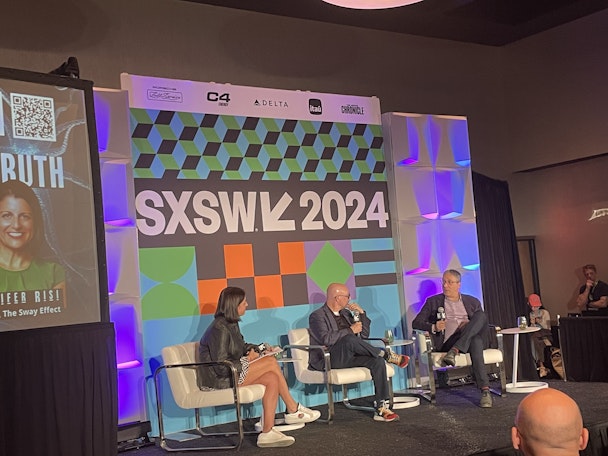AI anti-hypers speak out at SXSW: ‘Charming bullshit is still bullshit’
AI has been a predictable standout theme at this year’s conference. But flagrant enthusiasm for the technology is being tempered by more pragmatic voices.

Psychologist Gary Marcus speaks during a panel at SXSW 2024. / Webb Wright
It’s festival season in Austin again.
Starting March 8, legions of entrepreneurs, artists, marketers, tech enthusiasts and professionals of virtually every other stripe have descended on the Texas capital for SXSW, one of the world’s most celebrated annual conferences.
This year, AI has been the topic du jour. A litany of panels are being hosted each day to discuss the technology’s impact on everything from journalism to astrophysics. But while unmitigated enthusiasm for the potential of AI is definitely running high, there’s also been a detectable undercurrent of skepticism.
“Everybody’s talking about AI, [and so] it feels like a term that doesn’t mean anything,” Mike Nellis, founder and chief executive officer of Authentic, an ad agency specializing in political campaigns, told me during an interview yesterday.
Nellis has been disheartened by the amount of grandiose talk that he’s heard about AI during his time at SXSW this year, and he believes that this kind of quasi-religious talk about what’s ultimately a tool causes people to misunderstand its real function and utility.
“You have a lot of people who act like they’ve seen the face of God, and I just don’t think that’s the case,” he says. “Who knows how the technology is going to advance? I know what it can do today. I’m focused on what it can do right now and then trying to lay the framework so that I can adjust as needed as the technology gets better.”
Nellis compares the current exorbitant talk around AI, which he says he’s heard at this year’s SXSW conference with the hype that surrounded cryptocurrency not so long ago: “Everybody who was an expert in crypto two years ago is an expert in AI right now,” he told me. Crypto, NFTs and all things blockchain- or web3-related were, as most marketers will be able to readily recall, all the rage in 2021.
The following year saw the onset of a so-called ’crypto winter,’ followed, of course, by the collapse of then-leading crypto exchange platform FTX, which caused most brands to cool their heels on any blockchain-based marketing efforts.
Still, web3 was a standout theme at SXSW last year, as the hype cycle was gradually giving way to a more sober conversation about the technology’s practical business applications. It’s much less prominent of a talking point at the conference this year (the term ’web 3’ is only mentioned in three panel descriptions in the 2024 conference lineup).
Nellis’s skeptical tone was echoed by psychologist and author Gary Marcus yesterday in a panel focusing on AI-generated misinformation. In response to his fellow panelist’s comment that ChatGPT has a tendency to provide factually inaccurate information in a “charming” manner, Marcus responded drily: “Charming bullshit is still bullshit.”
Marcus assured audience members that he’s by no means opposed to AI (though he’s been publicly critical of grand proclamations made by some of AI’s biggest names, including OpenAI’s Sam Altman).
Nellis takes a similar standpoint. Rather than naysayers, these two might be described as AI ’anti-hypers’ – professionals who are passionate about the technology but who don’t want to see its positive potential washed out by the bright lights of highfalutin and unfounded talk.
Depending on who you ask, AI is either still at the peak of its hype cycle or somewhere further along the far end of the bell curve, trailing steadily downwards in the direction of a more level-headed pragmatism.
Certainly, much of the rhetoric around AI over the past fifteen months or so – since the release of ChatGPT in late 2022 permanently altered most people’s perceptions of the technology – has had an apocalyptic tenor, and much has been written about its potential to push a significant number of people out of the workforce.
But that tenor appears to be gradually giving way to a more nuanced way of thinking, which, as Nellis alluded to, regards AI as just another tool in the human arsenal.
For Joe Staples, chief creative officer at ad agency Mother, one of the key variables in ensuring that AI is used as a means of human empowerment – as opposed to displacement – is education.
Modern ad agencies, in his view, must be able to harness AI in order to enhance the abilities of their employees in order to be able to keep up with the rapid, industry-wide changes that the technology is precipitating.
In an interview over coffee this morning, he asked me rhetorically: “How could you teach younger people how to become essentially creative directors in six months? If you can do that with the use of AI, you don’t need to fire half your workforce.”
For more on the latest happenings in AI, web3 and other cutting-edge technologies, sign up for The Emerging Tech Briefing newsletter.

